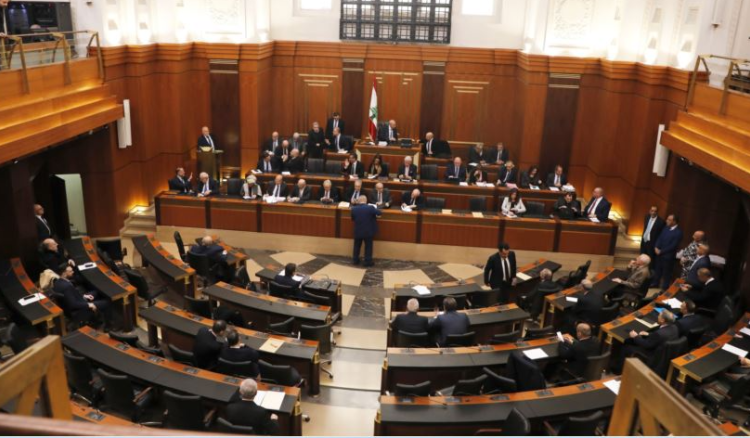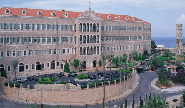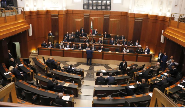
Parliament’s legislative session on Monday morning opened under palpable tension, against the backdrop of deep divisions over proposed amendments to the electoral law, particularly concerning the voting rights of Lebanese expatriates.
Shortly after the session began, MPs from the Lebanese Forces (LF), the Kataeb party and several members of the Change bloc walked out in protest. Their departure came after a proposal to amend the electoral law was excluded from the agenda. The proposal, primarily championed by LF’s Strong Republic bloc, seeks to allow expatriate voters to elect all 128 members of Parliament, as was the case in the 2022 elections, rather than limiting them to the six diaspora-designated seats outlined in the current electoral law.
Confronted on the matter by MP Georges Okais, who reminded Speaker Nabih Berri of a petition signed by over 65 MPs demanding the proposal be added to the agenda, Berri responded bluntly, “We have not officially received this petition. When it reaches us through the proper channels, we will respond according to the rules. Do not threaten me. This session will proceed without threats.”
His remarks triggered an immediate backlash, leading to the departure of LF MPs, followed by Kataeb members and several independent legislators.
The current electoral law, passed in 2017, stipulates the creation of six parliamentary seats for the diaspora, one per continent, in addition to the existing 128 seats, bringing the total number of seats to 134. However, this provision has never been implemented. In both the 2018 and 2022 elections, expatriates voted in their original constituencies in Lebanon.
Looking ahead to the 2026 elections, Speaker Berri is pushing for the application of this clause, with diaspora seats distributed confessionally: one Sunni, one Shia, one Druze, one Maronite, one Greek Catholic and one Greek Orthodox. This approach is firmly rejected by LF leader Samir Geagea, who insists that expatriates should vote in their home regions to fully participate in national political life.
Following his bloc’s withdrawal, LF MP Georges Adwan denounced what he described as a break with parliamentary tradition: “Any draft law classified as urgent is automatically placed on the agenda of a plenary session. This is the first time in thirty years that such a proposal is excluded, especially on a matter of national importance like expatriate voting.”
He added, “We are not trying to obstruct legislative work. On the contrary, we seek to accelerate it.”
Even before the session began, Deputy Speaker Elias Bou Saab had anticipated the political confrontation: “We are heading toward a political showdown. The request to urgently include this electoral proposal is a political maneuver. It is not on the agenda.” He also noted, “Any parliamentary bloc has the right to walk out. If quorum is lost, the session is suspended. Otherwise, it will proceed.”
Among those who chose to stay was Progressive Socialist Party MP Hadi Abou al-Hosn, who voiced support for the proposal but refused to disrupt the session: “We support adding the proposal to the agenda, but we will not walk out. We have always defended institutional continuity and opposed obstruction.”
Monday’s agenda includes several draft laws and proposals, among them amendments to the 2025 state budget and a bill granting monthly financial aid to military personnel, both active and retired.
During the morning session, Parliament gave its green light to a loan agreement with the World Bank for the implementation of a renewable energy project.
It also approved the opening of a line of credit in the 2025 budget for the Ministry of Education and Higher Education, to allow for a contribution to the Mutual Fund for tenured professors at the Lebanese University. This contribution is intended to cover social and health assistance.
In the same vein, the allocation of 1,500 billion Lebanese pounds for the Judges’ Fund was approved.
Parliament also exempted individuals affected by Israeli airstrikes on Lebanon during the war with Hezbollah from paying certain taxes and other fiscal obligations.
The session, which adjourned shortly after 2pm, was due to resume at 6pm. However, the Speaker of Parliament, Nabih Berri, postponed it until 11:00 tomorrow, Tuesday, due to the absence of a quorum, with only 53 deputies present.
MPs are expected to examine texts related to the practice of certain professions, notably radiological sciences and pharmacy, as well as proposals concerning commercial leases and the prerogatives of municipalities.
Finally, MPs are set to vote on Lebanon’s accession to the Madrid Protocol, which concerns the international registration of trademarks.



Comments